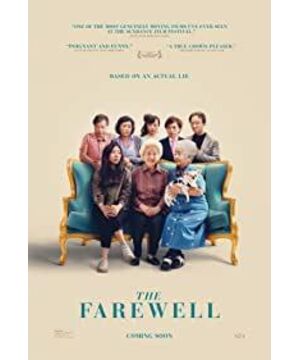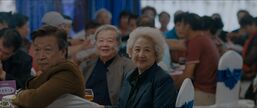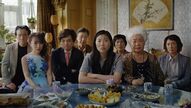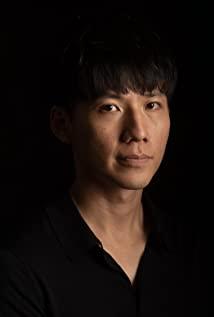Author | cardamom
A habitual skeptic, thinking is like winding a thread, writing is like knitting a sweater.
Just last week, there was news that Wang Ziyi was about to direct the English version of " Like Father, Like Son " ( 2013), which will be Hirokazu Kore-eda's acclaimed film on the big screen in North America.
In 2019, with " The Farewell ", which was adapted from his own experience, Wang Ziyi jumped into the public eye for a while and became one of the most high-profile Chinese directors in the United States recently. After "Shoplifters" ( Shoplifters, 2018) won the Palme d'Or at Cannes, Hirokazu Kore-eda, who is good at describing family ties, has become a hot Japanese director in the international film industry.
With all the above, people can't help but look forward to this collaboration - how Wang Ziyi, who has unique insights into family relations and cultural differences between the East and the West, will add his own different perspectives to this delicate and flowing oriental story, showing how The new edition of "Like Father Like Son"?
Such a high-profile new work is still in the development stage and cannot be seen by the audience yet. At this point, it may be more appropriate to review Director Wang Ziyi's "Don't Tell Her", which was called the dark horse of the American independent film industry last year.
The "Waterloo" of the Oriental Market
An unexpected "acclimatization"
The story of "Don't Tell Her" is based on director Wang Ziyi's personal experience, and tells the story of a Chinese family who decides to hide their illness from their terminally ill grandmother. Growing up in the United States, Billie (Awkwafina), who believes her grandmother has the right to know about her condition, suffers inner torment when she returns home for her family's fake wedding for her grandmother. During this family reunion, a unique battle between Chinese and Western cultures in the family also kicked off...
As a small production film with a cost of 3.5 million US dollars, all-Asian faces and a large number of Mandarin lines, "Don't Tell Her" not only won nearly 18 million box office results in the United States, but also received rave reviews (Rotten Tomatoes). Freshness 98%, Metacrtic score 89/100). The film not only won a series of nominations for a series of blockbuster awards such as the Sundance Film Festival, the Hollywood Film Critics Association Award, and the Golden Globe Award, but also made the actress Awkwafina the first actress in history to win the Golden Globe. Asian actress.
It is a pity that "Don't Tell Her" did not replicate the success it achieved in North America in the Chinese market. Not only did it encounter the initial turmoil of shifting gears, but even after taking advantage of the momentum of the Golden Globe Awards in January, it only received less than 4 million at the box office in just over a week, and received a polarizing effect. Evaluation.
Why did a work with Asian faces, familiar languages, and about the daily family relationship in China encounter such a waterloo in the Chinese market, which should be the most intimate?
I think this is inseparable from the ambiguous cultural attitude of the film and the play, which makes the audience in the real Chinese culture unable to identify and empathize.
Obviously, director Wang Ziyi wants to use this film to show the living state and family relationship between Chinese and Western cultures as a Chinese-American. But throughout the whole film, we can clearly feel that the story is from a westernized, established binary judgment perspective, to criticize the ignorant and outdated parts of traditional Chinese culture, and through certain packaging, it presents an ambiguity neutral and objective attitude. To an oriental audience steeped in Chinese culture, such a gesture appears cunning and unpleasant.
forceful expression
Deliberately crafting cultural differences
At the beginning of the film, I borrowed a phone call from Billy who was on the streets of New York and her grandma who was in a domestic hospital, intending to make a contrast between the cultural differences between China and the West - the streets of New York are lively, people come and go, full of life, and freedom is flying. With a relaxed atmosphere of ideology, Billie walks through the crowd, making jokes with passersby from time to time; the hospital space is gloomy and cold, and grandma's mentions are all "New York Street Earring Robbery Causes Stitches" The older generation will believe Sensational information.
A simple intergenerational dialogue, because Zhao Shuzhen, who plays the grandmother, raised her eyebrows when she spit out "grabbing your earrings", and became a pretentious gesture. This rather deliberate performance trace was staged more than once throughout the film. Obviously, this is the director's intentional scheduling choice, in order to emphasize that the Chinese tradition represented by the "older generation" has long been out of tune with the current society. It's just such a hard carving technique that the actual effect of the film can't help but change its taste.
Similar temperament scenes run through the entire film. For example, when Bili came home for the first time, the director used a long space to depict the black car drivers swarming at the station and the unfinished buildings with outdated aesthetics on the street to show Bili's hometown, an old city in northeastern China. style. The most outstanding thing is that when Bili arrived at her grandma's apartment, with the ups and downs of the orchestra, we witnessed a 22-second pull-up shot that dramatically advanced all the way to the abject exterior of the old-fashioned apartment building, and Bili felt embarrassed about it. A cramped demeanor.
Excessive soundtrack and mirror movement resulted in a more awkward viewing effect. The plot that should make the audience resonate with Billie's emotions, but exudes the self-satisfied value judgment of the story creator.
"Perfect" Billie
A glorified self-projection?
This pre-set tone, which already has a biased perspective, has a very direct impact on the characterization and narrative of the film, resulting in weak line writing and character setting.
In the restaurant scene where the whole family gathers and explores whether the moon in foreign countries is rounder than China, Chinese relatives and Billie's parents form a sharp confrontation between "seeing the money and opening the eyes" and "long live freedom". Wang Ziyi, who grew up in Western culture, may not have been able to capture the hidden tensions of real Chinese kinship . The intensification of contradictions that are too much
The audience seems to be transported into an animated film, amazed at how the characterization can be so black and white that it seems tedious and annoying. Except for Billie, who is a slightly rational protagonist in the film, the portrayal of other family characters is flat and single-minded . This seems to be the director's setting for each individual in the context of Chinese culture.
The comprehensive temperament presented by "Don't Tell Her" makes it difficult for viewers not to question Billy's character. What kind of attitude do the young Chinese-Americans, who have grown up completely under the Western value system of freedom and individualism, treat the attachment to traditional oriental culture, and the inevitable dross and old-fashioned values that exist in it, which have gradually drifted away from the modern world? ? Or, does this generation of "banana generation" who grew up in the United States have cultural roots? How much emotional connection and common language do they have with their blood relatives in China?
In the film, the director portrayed Bili as a near-perfect image—growing up in a Western environment, the relationship with her grandmother was as close as the grandchildren under her knees; all the respect and sympathy for her grandmother in the film also came from Bili. . She looks like a perfect person under the director's camera. In the film, all the cultural conflicts that Billie encounters come from the embarrassing words and deeds of family members other than herself - as if Billie herself is an existence detached from this "chaotic and anti-intellectual" family. In fact, Billie's role is very much like a role glorified by the director's self-projection of personal experience.
The problem this brings is that we cannot see that in real life, second- or third-generation immigrants like Bi Li are intertwined between Chinese and Western cultures, reflecting the difficulties, embarrassment and helplessness in their own behavior.
"The Footnotes of the Times"
Curious scene stack
In addition, there is no shortage of stories that are bluntly inserted into the film in order to highlight the "backward and ignorant state of Chinese society". In the hotel where Billy stayed, the middle-aged man who opened the room with the young lady, the sudden insertion of the mourning scene, and the black and white photo of the war era hanging in the grandmother's room... almost lie in the film.
These so-called "footnotes of the times" do not have much substantive help to the main story, but instead make the audience dance because of their deliberate placement. There are so many bridges like this, it seems that the whole film is a "one pot stew" made up of chaotic elements without careful consideration, and through the stacking of negative scenes, a kind of curious landscape of Chinese society is created.
Of course, there is no doubt that the film reflects many realities with Chinese characteristics: the love of face , the desire to explore privacy , the supremacy of money, the promotion of marriage , etc. These are all real and traceable social phenomena. I do not intend to deny these characteristic phenomena touched on in "Don't Tell Her", and I also agree that they carry the dross of Chinese society's bundled family relationships.
However, what makes some viewers really unhappy is not the "uglification of Chinese people and the presentation of stereotypes" as mentioned in some criticisms on the Internet, but the presupposition of a lofty vision and the lack of a complete understanding of the reality of China. The resulting lack of empathy, and a self-polished neutrality. The director used this film to draw a clear line between himself and these "backward realities", and did not have a deeper understanding of the underlying causes of this complex social phenomenon. From this level, the layout of "Don't Tell Her" is narrow.
Because of this, the success of "Don't Tell Her" in North America shows that the film land in the United States is still lacking in works that truly belong to Asians. The public's perception of Asian culture is still in a limited range. Under such circumstances, even if the presentation of "Don't Tell Her" is a little thin, it is better than no presentation at all.
Whether it is "Crazy Rich Asians" (2018) or "Don't Tell Her", the emergence of these "Asian" film and television works, although still immature, is at least a beginning. In the longer term, the audience is waiting for more and more full-bodied Asian masterpieces to wake up this still-slumbering market.
From this perspective, perhaps we can add more expectations to Wang Ziyi's version of "Like Father Like Son".
*This article is exclusively published by cinewoo, and the content only represents the author's point of view and does not represent the position of this official account. Without authorization, may not be reproduced.
View more about The Farewell reviews











